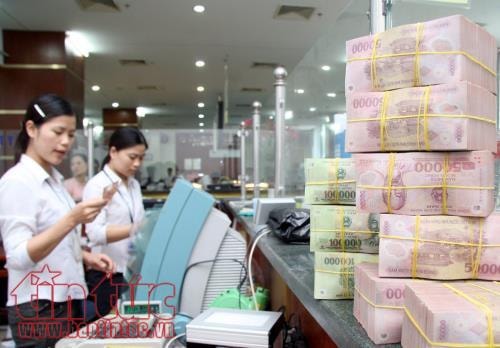Are savings taxed?
Taxing interest and savings deposits, although still just a proposal, has caused much controversy among people and economic experts. Many opinions say that taxing interest and savings deposits would not only be tax collection but also go against the interests of the economy.
Tax on tax
The proposal to tax income from savings interest (with large profits, hundreds of millions of VND) has just been made by Lawyer Truong Thanh Duc (Basico Law Firm) at the Workshop to collect opinions on amending 5 Tax Laws of the Vietnam Chamber of Commerce and Industry (VCCI).
Taxing interest and savings deposits is tax collection. |
Compared to the previous proposal to tax savings interest (which was proposed by the Ho Chi Minh City Real Estate Association in 2013), Mr. Duc's opinion this time wants to focus on large deposits (which can be savings deposits, deposit contracts, bond purchases...) which bring in interest income of hundreds of millions, even billions of dong. According to Mr. Truong Thanh Duc, once savings interest reaches billions, it should be seen as an investment similar to investing in stocks and real estate.
Economic expert Lawyer - Doctor (LS.TS) Bui Quang Tin, CEO of Bizlight Business School, believes that the nature of tax is to redistribute income in society and create fairness. However, not all people's income can be taxed, because almost all people's income is regulated by many taxes, one form or another.
For example, if you are a salaried employee, personal income tax will be calculated on the balance after 9 million. Specifically, if your income is 10 million VND/month, the personal income tax you will have to pay is the balance of 1 million VND, and salaries under 9 million VND will not be taxed. Thus, the amount of money saved after receiving your salary to save, if taxed, is no different from tax on tax. Or assuming that the total amount of money saved from 9 million VND is not taxed according to state regulations, and is now taxed, is no different from violating the personal income law.
In case of money obtained from selling assets, that income is also taxed, not exempted at all. Or in case of opening a business, all the income of that business is also taxed.
“Just a few examples above show that all types of personal income to businesses, personal or business assets have been adjusted and taxed by the tax industry. Therefore, if we tax deposits and savings interest, it is a double tax and overtaxation,” emphasized Lawyer Dr. Bui Quang Tin.
Against the interests of the economy
Securities expert Dr. Phan Dung Khanh - Investment Consulting Director of MAybank - Kim Eng Securities Company also said that the above tax proposal is unreasonable and too tax-intensive, especially now that people have been and are still strongly reacting to the VAT increase.
Taxing deposits and savings interest also has consequences on bank interest rates, putting pressure on businesses and the entire economy. |
In fact, according to expert Khanh, people's current savings are the amount after completing tax obligations. Therefore, if taxing savings interest is not only tax on tax but also puts pressure on banks. Because they do not want customers to suffer, banks may be forced to raise deposit interest rates, which will lead to an increase in loans, the consequences will be on the business side and put pressure on the economy.
Agreeing with this issue, Lawyer Dr. Tin also stated that taxing deposits and savings interest also greatly affects the operations of the banking system. Because the total assets of commercial banks, mostly from 80-90% are from capital mobilization sources. Accordingly, if taxing deposits and savings interest, people will switch to other investment channels such as stocks, real estate, business, etc. Therefore, this tax will have the risk of reducing the source of money from capital mobilization.
In addition, it not only affects the banking system but also distorts the financial market, making it difficult for state agencies to manage. It is worth mentioning that not only is it difficult to manage taxes, but many banks will find ways to support depositors without being taxed.
From a legal perspective, Lawyer Tran Viet Quan, member of the Ho Chi Minh City Bar Association, said: According to the current personal income tax law, income from interest on deposits at credit institutions is tax-exempt income (Article 4, Clause 7). That is, in principle, interest on deposits is a form of income, but is included in the tax-exempt group to encourage people to save on spending, deposit savings, and promote capital mobilization activities of banks.
This policy of Vietnam is also similar to the international one. Like in the UK, interest from personal savings deposits is also not subject to tax. But in some other developed countries, interest on deposits is still subject to tax. Accordingly, according to the explanation of Lawyer Truong Thanh Duc, this is not unreasonable.
However, in the context of Vietnam's socio-economic situation still in the integration stage with many difficulties, it is necessary to assess the impact of this proposal, whether it is suitable for application or not.
“For example, the above proposal is focusing on large deposits, with interest rates of about 200 million VND/year or more (equivalent to about 3 billion VND in deposits with the current average interest rate of 6.5%/year). If applied, the impact is likely to be that people will limit the use of savings as an investment form. So how will idle money be invested and by what tools? Meanwhile, Vietnam currently has few attractive investment channels, so research is needed to avoid financial distortions,” Lawyer Quan further analyzed.
According to Hai Yen/baotintuc
| RELATED NEWS |
|---|




